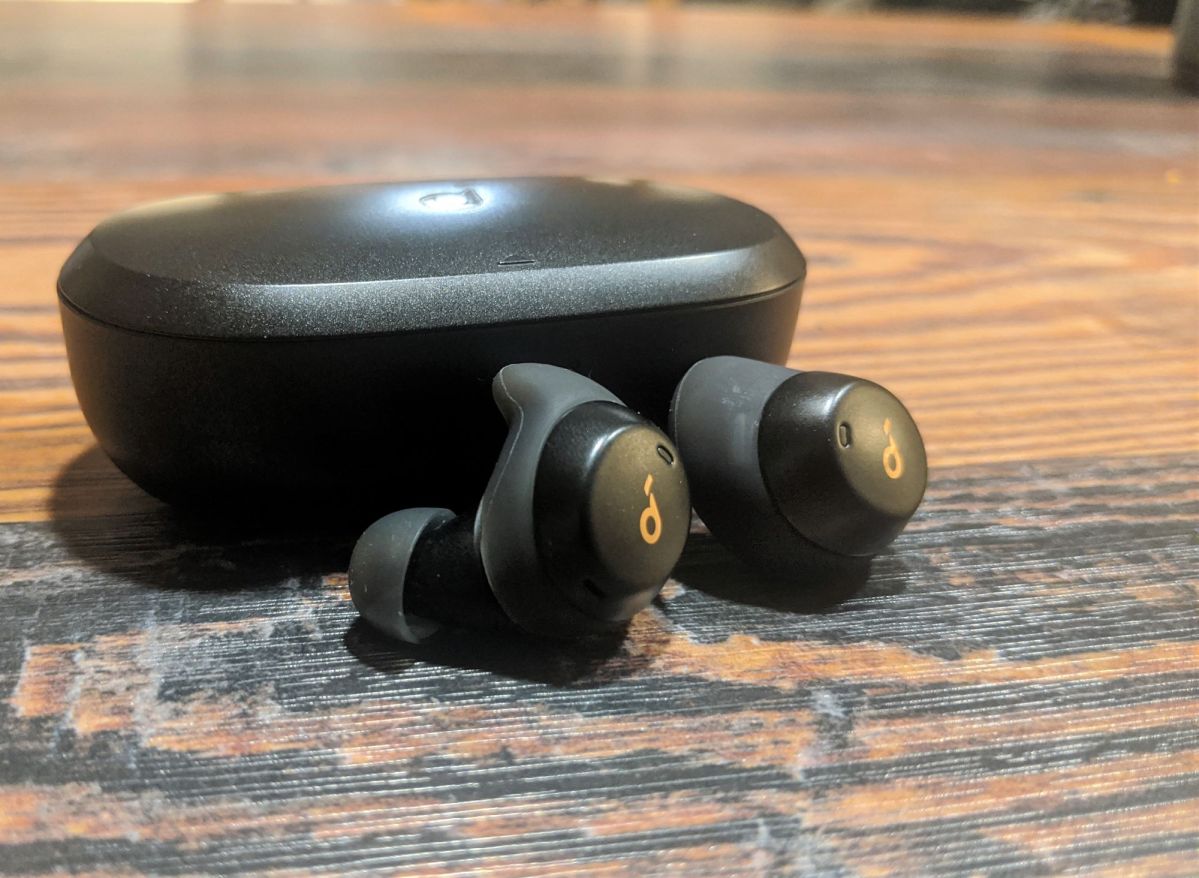“The Spirit Dot 2 have the winning combination of good sound and affordability.”
- Secure fit
- Great passive noise reduction
- Solid low end
- Average features overall
- Limited touch controls
One of my biggest, and perhaps only, complaints about the Anker Soundcore Spirit X2 was their earhook design. It’s not that looping those hooks over your ears is an uncomfortable experience, because they do fit well. It’s that, when compared to traditional true wireless earbuds, the earhook style is a far less appealing option.
The $80 Anker Soundcore Spirit Dot 2 is the company’s answer to folks who desire the value of the Spirit X2 in a more compact package. The features may not be quite the same, but the Dot 2 possess the favored earbud design for the same price as the Spirit X2.
Is that enough? Time to find out.
Out of the box
There’s nothing particularly noteworthy about the packaging of the Spirit Dot 2 or the accessories inside, other than the fact that the box they come in resembles the Spirit X2’s closely enough that I had to double check and make sure I was grabbing the right buds. That, of course, should be chalked up to Anker’s consistent color scheme.

Aside from the buds and their charging case, the Spirit Dot 2’s package includes four extra pairs of eartips, two pairs of “Airwings” (or earfins), a USB-C cable, and the standard documentation. For what it’s worth, I stuck with the eartips and earfins that the Spirit Dot 2 arrived with. But your mileage, and ears, may vary, so it’s nice of Anker to provide several different options at this price.
The Spirit Dot 2 connect to your mobile device in the same way you’ve come to expect most true wireless earbuds to – pulling them out of their charging case enacts their automatic pairing feature, and all that’s left to do is find them in your phone’s settings and connect. Besides the Bluetooth 5 tech supported by these buds, Anker says the Spirit Dot 2 have dual transmitters that make it possible to connect each earbud individually to your phone. The company says this can provide up to 30 percent lower latency, and while I can’t prove that statistic specifically, I can say that I didn’t come across any notable latency issues when watching YouTube or TikTok clips on my phone.
Design
I wouldn’t call the Spirit Dot 2 the smallest buds I’ve ever lodged into my ears — off the top of my head, that honor might go to the 1More Colorbuds — but they certainly are small, and significantly less hefty than a pair like the Edifier TWS NB. It’s a vague way to rank the size of these buds, but without access to weight specifications, it’s the best I can offer.

Probably the most comparable buds to the Spirit Dot 2 design-wise are the Google Pixel Buds 2. They both employ similar ergonomic shapes with earfins meant to securely position them in your ear. The Spirit Dot 2 are somewhat bulkier and put more pressure on my ears as a result. But the secure, comfortable seal created by the Spirit Dot 2 closely mirrors my experience with the Google Pixel Buds 2, with the more expensive Google product getting an edge in comfort when listening for longer periods of time.
While Anker recommends these buds for various uses like working out, sports, or traveling, I wasn’t able to take the Spirit Dot 2 on a run to test their merit due to poor air quality in my area at the time of this review. I did, however, sneak in a few walks and a handful of at-home workouts with them, and they held up well during those activities.
The Spirit Dot 2 have no buttons, instead opting for touch controls entirely. This works, but in a limited capacity. You can play, pause, and skip tracks, answer and end phone calls, and activate your voice assistant through a series of touches and presses — and all these controls work as advertised. But there’s no volume control incorporated into the Spirit Dot 2, with Anker directing you to the “connected device” for adjusting volume in the buds’ manual. That might be fine while riding the train during a commute (pre-2020, of course), but when I’m out for a jog, the last thing I want to do is unzip my fanny pack, pull out my phone, and turn the volume up. For my tastes, the Spirit Dot 2’s controls are a command short of being fully functional, and that’s an issue even at this price.
The charging case, by the way, is a moderately sized vessel with Anker’s logo embedded across a lid that slides out to reveal the buds. I initially hadn’t planned on mentioning it, since it seemed largely unspectacular. But after it survived a round of chewing from one curious puppy, I felt compelled to vouch for the sheer sturdiness of the case.
Features
I alluded to the discrepancy in features between the Spirit X2 and the Spirit Dot 2 earlier, and I’m here to tell you that those differences are very real indeed. Again, the Spirit Dot 2 offers the preferred design, but they have a hard time stacking up overall to their earhook counterparts.

The Spirit X2 sit at nine hours of battery life per charge and 36 hours of playback in total when factoring in the charging case. The Spirit Dot 2, by comparison, offer just 5.5 hours of playtime per charge and 16 hours in total. That’s better than the Google Pixel Buds 2, and because I gave the similarly priced 1More Colorbuds and their six hours of battery a pass, I’ll begrudgingly do the same with the Spirit Dot 2. But with buds like the $40 SoundPeats Truengine SE or the $30 JLab Go Air offering six and five hours of playback, respectively, the bar at this price is about to change.
The IP68 weather-resistance of the Spirit X2 gives the earhook buds protection against complete submersion in up to 2 meters of water for no more than 30 minutes. With the Spirit Dot 2, an IPX7 rating allows them to be submerged up to a meter deep, which is better than most other budget buds that we’ve reviewed at Digital Trends. That said, the Spirit X2 have full dust protection, something the Spirit Dot 2 lack.
Both the Spirit X2 and Spirit Dot 2 have Anker’s “SweatGuard Technology,” which is essentially a coating on the buds that is supposed to add more defense against sweat. Once again, I don’t think I’ve tested these buds long enough to say how well that feature works, but I do think it’s important to mention since it’s clear that Anker is at least making the extra effort to make its products sweat-friendly.
Audio quality
In terms of the sound quality of the Spirit Dot 2, I found myself thinking that there is plenty to like here, but also ample room for improvement.

The Spirit Dot 2 have smaller drivers than the Spirit X2, 8mm versus 12mm, respectively. However, both pairs have Anker’s BassUp technology, which Anker says uses an algorithm to analyze and amplify bass. While they didn’t quite produce the “wow” factor that I experienced with the Spirit X2, the Spirit Dot 2 are certainly capable earbuds when it comes to the low end. My personal workout playlist has everything from Big Sean and Eminem’s No Favors to Granger Smith’s Backroad Song, and though I thought the Spirit Dot 2 overinflated the low end of the latter, these buds have generally solid bass that will please most bass-loving gym junkies.
With a firm foundation of bass to stand on, the Spirit Dot 2 have decent clarity for their cost, even if the rest of a track sometimes gets overshadowed by low notes. I think I prefer the sound signature of the 1More Colorbuds — which lean far less on the low end for a more balanced, pleasant sound – but I don’t think most folks will have much to complain about in terms of audio quality with the Spirit Dot 2. However, the Spirit X2 come with aptX support, while the identically priced Dot 2 lack it. They support AAC and SBC codecs, but skipping aptX leaves the Dot 2 with a puzzling void.
Possibly the most underrated aspect of the Spirit Dot 2’s sound is the passive noise reduction that the seal in your ear provides. It does a remarkable job blocking out your surroundings – my air purifier blasting on ‘turbo” about six feet away became essentially inaudible – and serves as a bedrock for making clear calls with the earbuds’ pair of built-in microphones. Anker seems to have a firm grasp on great isolation, as the Liberty 2 Pro also have a very good seal. Sure, active noise cancellation is great when executed well. But for $80, it’s hard to complain about how much sound these buds passively keep out of your ears.
Our take
These should have cost $60, or at least anything lower than $80. Notably lagging in features compared to the identically priced Spirit X2, Anker’s pricing of these buds is puzzling. Though they do sound good and come in at an affordable price, which may prove to be a winning combination for many, it can be hard to wholly recommend them against the competition (including Anker’s own line).
Are there better alternatives?
The $100 1More Colorbuds sound better, though aren’t quite as equipped for working out. The identically priced $80 Anker Soundcore Spirit X2 have better features overall and comparable sound quality. but their earhook design may be less desirable to some people. For half the price, the $40 SoundPeats Truengine SE offer an intriguing mix of comfort and sound quality, but lack bonus features like wireless (or quick) charging.
How long will they last?
The Spirit Dot 2 come with an 18-month limited warranty, they feel durable, and they have solid protection against water. In other words, they’re well-suited to last for the foreseeable future.
Should you buy them?
If you’re OK with forgoing features to take advantage of the in-ear style of the Anker Soundcore Spirit Dot 2, then they’re a good option. But if earhooks aren’t a dealbreaker, the Spirit X2 are better pretty much across the board.




